- Home
- Craig Lancaster
The Fallow Season of Hugo Hunter Page 23
The Fallow Season of Hugo Hunter Read online
Page 23
On our way to Williston, I called Raj and told him we were bringing his father home. I fought to deliver my message in matter-of-fact terms, mostly to keep Raj on an even keel so he could hear what I needed him to hear, but also to keep my own emotions at bay and to keep Squeaky’s from spilling over any more than they already had. Goddamn Hugo. Here we went again.
“You know the rehab place behind the hospital—shit, I can’t remember the name. Anyway, that’s where he went before,” I told Raj. “Go up there in the morning and tell them what happened. They’ll be able to help get him in there.”
“OK,” Raj said.
“Are you scared, bud?” I swallowed hard.
“A little.”
“Don’t be. We’ll get him.”
I hung up.
“You gonna call your dad?” I asked Squeaky.
“Ain’t nothing to say yet, is there? Nothing I want to say anyway.”
“No, I guess not.”
“You gonna call your wife?”
“Same answer.”
We found Hugo where Jeff said he’d be, in a 1970s travel trailer parked behind the bar where I’d met him that summer night in Williston. A light in the front window burned. I didn’t bother with a knock.
Hugo sat slumped in a camp chair, half in and half out of a pair of jeans, T-shirt caked in his blood, his face a circuit board of stitching that made Squeaky’s handiwork look like a surgeon’s. That beautiful face, crumbled. I choked back the rising bile.
I shook him. Nothing. I shook him again, and Hugo lurched out of sleep with a haymaker right, his forearm clubbing me against the head.
“Grab him!” I yelled.
Squeaky put his weight into it, smothering Hugo’s wild where-am-I swings and tying up his arms.
“Hugo,” he said. “It’s Trevor. I’m here with Mark.”
Hugo looked at Squeaky and then at me, and his eyes rolled back in his head.
“Unbelievable,” Squeaky said. “Look at this shit.”
“Let’s just get him out of here.”
We struggled with the might-as-well-be-dead weight of him, trying to get his clothes on. Once Squeaky had things under control, I made a quick inventory of the trailer. A space heater burned in the dining area, which was thick with pizza boxes and paper plates with barnacles of food dried on them. Broken caplets and their spilled contents littered the floor. I scooped a few into a plastic grocery bag, in case the medical folks wanted them. Scraps of paper caught in hardened pools of vomit.
“Jesus,” Squeaky said.
“Well, we figured.”
“Yeah, but Jesus.”
I cupped Hugo under his arms and nodded at Squeaky to catch the legs.
“Let’s go,” I said.
47
We were brushing the eastern outskirts of Miles City, under a pitch-black sky and more than halfway home, when Hugo came to in the makeshift bed I’d fashioned in the crew cab of Squeaky’s truck.
He sat up. “What’re you guys doing here?”
“We were in the neighborhood,” I said.
“My head.”
“I imagine.”
“I gotta lay back down.”
I took off my seat belt and turned around in my seat. Hugo was covering his eyes with his hand. “We’re taking you home,” I said.
“I need a fix.”
“Fuck you,” Squeaky said.
Hugo didn’t say anything, didn’t react in any way I could see. And then his chin began quivering and his face wrenched up. I looked away.
“Mark?” The voice quavered and broke.
“Yeah, Hugo?”
“Nothing.”
“OK.”
I turned back around and watched as Miles City filled our view. Squeaky ground his teeth. I couldn’t begrudge him the anger at Hugo, but Jesus. The timing couldn’t be worse.
“Mark?”
I turned back around. “Yeah?”
“I’m sorry.”
“I know you are.”
“I can’t stop fucking up.”
“Yeah, you can.”
“I’m sorry.”
“I know.”
I pulled out my phone. A little juice remained in it. “Hey, Hugo, Lainie wants to talk to you. You want me to call her for you?”
I interpreted the lack of a response as a yes. I dialed her up. I told her that we were bringing him in, that he was lucid, and that I’d be home in a few hours. Then I handed the phone over the seat.
What followed was mostly the squelched garble of my wife’s voice at first, with a few more robust responses finally coming from Hugo, a yes here, a no there. Then “I know,” and “Yes, please.”
A few minutes later—it was the damnedest thing—I heard a voice coming through so clear and true that I had to turn around and see what was going on. There lay Hugo, asleep, an angel’s face somewhere under the carnage, with my phone at his ear and my wife singing “Hush, Little Baby” to him across the miles.
48
It was three a.m. before we reached Billings, the final hundred-mile stretch driven by me. The chore couldn’t have been done without Squeaky, there’s no doubt about that, but every man has his limits. Squeaky’s was Forsyth, Montana.
“Mark,” he said, “I think I just saw a dinosaur running alongside the highway.” He might have. I don’t know. But I figured it best that I took the wheel anyway.
I didn’t call Raj till Hugo was safely inside the emergency room with the doctors. Codependency was the kind of clinical mumbo jumbo word I was still several weeks from really learning, much less using in an actual sentence, but even so, I don’t think that’s what kept me from calling earlier. Maybe for the first time I interjected myself into one of Hugo’s decisions for the clearest possible reason. His boy had no business seeing the version of Hugo that we brought into Billings Clinic that night.
When Raj did come around, however, I spared him no bad news. “He’s cut up,” I said. His midsection, mottled in purple and black and yellow, looked like somebody had been working him over with a pipe wrench, I told Raj. And the scatterings of opiates I found in the trailer suggested that a two-day patch job in the hospital wasn’t going to near cut it.
“I’ll go to the rehab place first thing in the morning,” Raj said.
“It is morning, kid.”
“Later, I mean.”
Beyond that, words seemed an unnecessary expense. All we could do was wait. I dipped my head back and fell into adenoidal sleep, a lapsing of consciousness that could be undone any time a nurse or orderly walked by. A few times, I popped an eye open and caught Raj bagging his own z’s. It was all good. He’d need his energy.
Squeaky had hightailed it out after the drop-off, back home to his wife and kids, and eventually to a confab with Frank. I left it with Squeaky to give the old man the score and let him decide what to do. A guy’s gotta start somewhere with the right living, and I’d made the decision that my friendship, relationship, whatever you want to call it with Hugo was going to be based on honesty starting then. I’d seen enough of what the other side brings. I’d like to say it was a thunderclap moment of clarity, but now, with the benefit of hindsight, I think it’s something I’d been working toward all that year.
“Are you Mr. Hunter’s brother?”
The voice brought me out of my veneer of sleep. I looked up into the face of an ER nurse.
“This is his son.” I pointed at Raj, asleep next to me.
She smiled at me, a suggestion that she was in on some kind of ruse. “He asked for his brother.”
I clapped my knees and willed my body to stand. “I guess that’s me, then.” I pointed at Raj again. “What about him?”
“He asked to see you alone. If his son wakes up, I’ll send him in.”
Hugo lay on a gurney in a small
operating room, waiting for transport to a suite upstairs. I sidled up to him and squeezed his hand, waking him.
“Mark.”
Looking at him challenged every bit of constitution I had. The doctors’ stitch-perfect patching had made my friend look like a shorter, more corpulent version of Frankenstein’s monster.
“I’m here,” I said.
“Mark, I’m so thirsty.”
I scanned the room and found a Dixie cup dispenser. I filled a cup with water and brought it to Hugo. I helped ease his head up and poured the water into him. Down his smock, too.
He swallowed and gasped for breath.
“More,” he said.
I repeated the maneuver, a bit more successfully this time.
“Thank you,” he said.
I pulled up a chair and sat down. “Raj is here.”
“Where?”
“Outside.”
“Does he . . . did you . . . ?”
“He’s got a pretty good grasp of the situation, yeah.”
“Oh, no.”
“He loves you. We all do.”
Hugo’s tears came again. I put my head down, grabbed his hand, and held on.
“Why?” he asked.
“Because we’re hardheaded sonsabitches.”
I waited for Hugo to fight off the sniffles.
“Listen, Hugo, he’s going to be in here in a sec and I’m going to leave you alone,” I said. “You guys have a lot to talk about, and the doctor wants to talk to me.”
“OK.”
“I’m your brother, you know.”
“I know. That’s what I told them.”
“OK,” I said. “But I need to tell you something first. It’s something I should have told you a long time ago. It’s not fair that I knew and you didn’t, and I’m sorry, and we can talk a hundred million times after this if you want to work it out, or you want to scream at me, or whatever. OK? Whatever it takes.”
Hugo didn’t take his eyes off me, which I took as a good sign. A focused Hugo was better by far than the alternative.
“OK,” he said.
“All right.” I gripped his hand tighter. “I’m your brother. But you’ve got another brother, a real one, your own blood.”
I gave it to him straight. He had two families. He had Raj and Lainie and me and Squeaky, and even Frank. Someday, he’d even have Frank again, I was sure of it. He also had someone he didn’t know. It’s better than nothing.
Tears brimmed in his eyes the deeper I got into it, and I struggled to hold my gaze on him and contain my own emotions. It’s a hell of a thing to tell a grown man that everything he’s taken for granted isn’t as it seems. I could give him his people, but I couldn’t give him directions on how to make his way to them. I couldn’t take away the hurt that the father he never knew was in the ground, unable to validate him. If he still needed that, he’d have to find it somewhere else.
“Jesus,” Hugo said.
“I know.” God, how I knew. I knew the weight of the thing that I’d just put on him. I’d been carrying it for a long time. It was the right thing to do, but it wasn’t without its toll.
“I don’t know what to do,” Hugo said. “About any of this.”
“That’s OK,” I said. “You’re not on the clock. It doesn’t have to be decided now.”
I reached for his forearm and grabbed hold, and Hugo—damn the pain, damn everything—seized hold of the back of my shirt, pulling himself into a sitting position and tumbling his head forward to my shoulder. For that one night, he buried his pain there.
49
Lainie found me asleep in the foyer just after eight and gave me an egg sandwich and some coffee to help knock the sluggishness out of me. She was dressed for work, her hair done up in a little ponytail. What a mess I must have looked in comparison.
“So?” she said.
“Cuts to the face, lacerated spleen, broken ribs, repeated concussions.” I was making a laundry list that broke my wife down, and I pressed on in exhaustion, just wanting to get through it, same as I had with Raj. If I kept it to a simple list, maybe I could keep emotion in check for just a little while. “Broken ankle, broken wrist.”
“Brain damage?” She knew about what the doctor had told him months earlier. Tears fell on her work clothes.
“They’ll know more after the scan,” I said. “Likely. Some, at least. Question is, will he be him on the other side of this? They couldn’t tell me. They just don’t know.”
Lainie pulled me in, and I dropped my head atop her shoulder.
“A week or so here, and then rehab,” I said, answering the remaining unasked question. “And after that—”
“We’ll see what happens,” Lainie said.
Yes. That was it precisely. You can have all the data points you want, you can make strategies all day long, and it doesn’t matter.
For Hugo, the fix—however much of a fix there could be—would have to be an inside job.
Excerpt from the final chapter of Hugo Hunter: My Good Life and Bad Times
The stories rarely end well for boxers.
For every Sugar Ray who has his money and his mental acuity long after he leaves the fight game, there’s a dozen guys who die penniless in a room without heat, their brains so addled and their lives so scrambled that there’s no saving them. This sport, it uses you up.
I know I’m a lot closer to those guys than I am to Sugar Ray, and I know that my future is full of unknowns.
How long before the physical toll starts to show in my personality, in my loss of memory, in my inability to function even on a simple scale?
How long can I keep staring down the devil of addiction?
What will I do if I fall all the way back down the hill I’ve worked so hard to climb?
I know the questions well. And the answers, it seems, are unknowable.
In the face of all this uncertainty, I try to stay focused on the things I can control. I go to work. I immerse myself in my studies. I lean on the friendships I have. I try to steel myself to reach out to the brother I have and don’t know.
I bend my life toward hope. That there’s some contribution I can make. That I’ll continue to learn. That somebody might love me again.
My friend Mark Westerly and I have an old joke, something that dates back to when I was just a kid and he was a sportswriter who covered me. Whenever I see him, I tell him to keep his chin tucked. It’s my way of saying that life will take a mighty rip at you and try to see how strong you can be. If you keep your chin tucked, it might ding you a bit, but it’ll never hit you square.
All this time I’ve been saying it, and I never stopped to think that I was giving him only half the game plan.
Yeah, you’ve got to keep your chin tucked.
But you also have to keep punching.
50
The first time I saw Hugo Hunter in rehab was tonight, the kind of late-winter Tuesday that makes you think maybe spring is coming after all.
He’d put in his twenty-eight days of inpatient treatment and was moved to sober housing while he prepared himself to go home for good and try to find a way to move in rhythm with the world he was in now. Part of that world lies in his brain, and what the future might bring to it. Thanks to an emerging interest in the lives of those who’ve left blood sports behind, Hugo is going to get some top-notch care, once he’s ready. A team at UCLA wants to scan his brain and see if he shows signs of chronic traumatic encephalopathy, the affliction being uncovered in former NFL players by the score. Closer to home, he’s going to have the cost of his therapy picked up, too. He’s consented to being studied. It’s not exactly the mark he hoped to leave as a boxer, but it may be the biggest contribution he could make. Funny how things work out.
Tuesday is Family Night at the rehab center, a chance for loved ones to step inside the
program and get an interior view.
We sat in plastic chairs arranged in a circle. Raj and I flanked Hugo, and Squeaky sat next to me. Lainie would have been there if not for Jo’s baby shower, and even then she vacillated until I told her that we’d be well represented at Hugo’s session and that life should go on as normal for us, that we had to take care of ourselves in addition to supporting Hugo. It wasn’t the kind of thing I’d often been inclined to say—it sounded like counselor talk to me—but the truth is I’d been hitting some Al-Anon meetings for a few weeks. I’d had the time, and I’d begun to see the wisdom.
After we’d introduced ourselves, the whole I’m-so-and-so-and-I-or-my-loved-one-has-a-disease thing, the counselor, a freshly minted college grad, asked if anyone wanted to start.
Hugo, thin pink lines crossing his face from the recently excised stitches, raised his hand. For the first time, he told his story. All of it. The truth.
The cocaine started a few months before we got to London, and it carried on as long as the money did. When Hugo got clean, he got back on track—right up to the days before the Qwai fight, when nerves overtook him and he began gorging on food to keep from seeking out a fix.
“Every bad thing that happened was because of a choice I made,” he said. The declaration bought Hugo a lot of goodwill from the other addicts in the room that night. They spoke directly to him, no punches pulled, and told him to keep owning his problem, that it was the only route to a lasting recovery. The night was his, but I got something out of it, too. I put my burden down.
After the session, I walked Hugo back to the house he shared with two other men trying to scramble back into the game. He hobbled on a cane, his right ankle in a cast. We lingered on the landing, just old friends catching up. It had been four weeks since I’d seen him. It felt like a hell of a lot longer than that.
“I’m proud of you,” I said.
“Thanks, Mark.” He smiled, but then it crumbled into a worrisome look. “Frank didn’t come. He’s mad at me, I guess.”

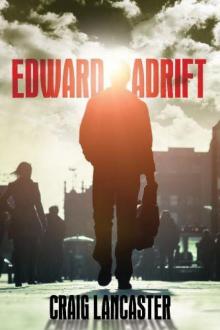 Edward Adrift
Edward Adrift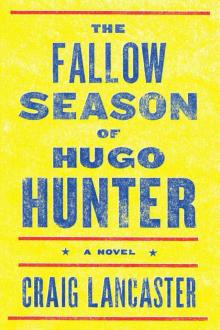 The Fallow Season of Hugo Hunter
The Fallow Season of Hugo Hunter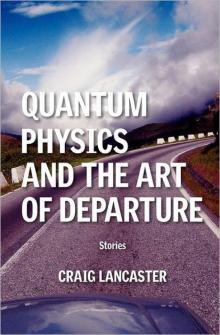 Quantum Physics and the Art of Departure: Short Shories
Quantum Physics and the Art of Departure: Short Shories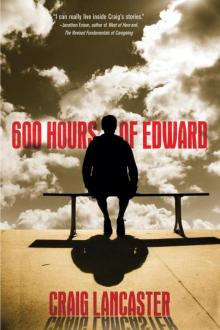 600 Hours of Edward e-1
600 Hours of Edward e-1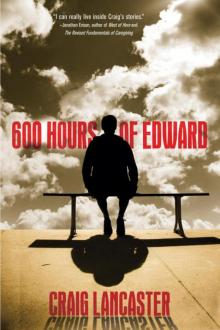 600 Hours of Edward
600 Hours of Edward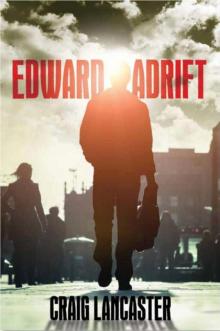 Edward Adrift e-2
Edward Adrift e-2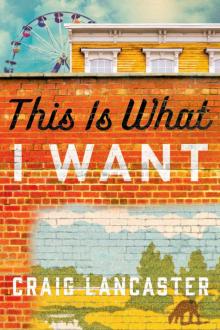 This Is What I Want
This Is What I Want